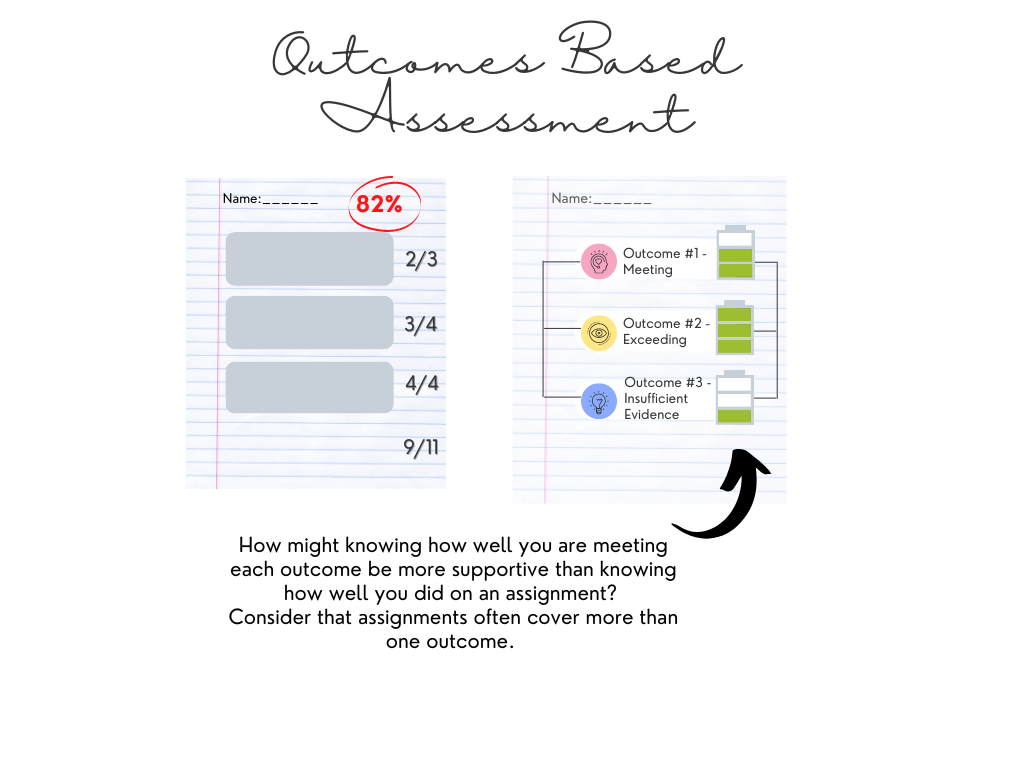-
Assessing Outcomes versus Grading Assignments
Shift your focus from grading tasks to assessing outcomes. Learn how this approach fosters deeper learning and provides a more meaningful evaluation of student progress. In this article, we will examine why assessing outcomes can target learning improvements better than grading assignments.Ooutcomes-based assessment starts with articulating what students will be able to do (the learning outcomes), followed by designing learning activities and assessments linked to the outcomes. However, even with clear outcomes and learning activities, instructors often fall into the habit of grading assignments rather than assessing outcomes. Consider the following scenario. Learner 1 and Learner 2 both have 75% in your class. How do you, the instructor, or the…
-
From Grit to Pearl: Understanding our SLEQs
Guest Post by Roslyn M. Compton, Sithokozile Maposa, Sheryl Mills, Schroder Sattar This past year we decided to approach our SLEQs differently. Because we planned and taught NURS 306 as a team, we decided to review our SLEQs as a team. In this post, we share the step-by-step process we used to shift from a solitary, dreaded, anxiety-provoking endeavor to a collegial, objective and reflective learning opportunity. We moved from a place of isolation, self-doubt, insecurity, and defensiveness to openness, curiosity, puzzling, surprise, and reaffirmed confidence. Rather than gritting our teeth, we polished our pearls by looking at our SLEQ, wearing our researcher hats and analyzing our SLEQ data. …
-
Experiential Learning Resources – 5 Top Picks
Summary: If you’re wondering how to enhance your experiential learning practices and make meaningful connections with learners’ knowledge and experiences, here are five valuable resources to support experiential learning. Discover rubrics, learning modules, reflection models, and prompting questions. Date of publishing: October 11, 2022 When exploring the USask Experiential Learning framework, you might want information about reflection frameworks, providing efficient feedback, and grading reflection. While we have built some resources around reflection and feedback, other higher education institutions have some gems to support Experiential Learning. Brock University – Reflection in Your Course and a Critical Reflection Rubric Lays out why and when students should reflect, what reflection could look like, and…
-
Announcing a New OER – Universal Design for Learning (UDL): One Small Step
We know that learners bring a wide range of knowledge, skills, backgrounds, and experiences into the classroom. As educators, we can expect to find variability in our classroom. The USask Learning Charter lists, as one of the Educator Commitments and Responsibilities, to Strive for Excellence in Teaching. This commitment means that educators work to develop respectful and inclusive learning environments that support student learning. Honouring this commitment requires that educators co-create with students a shared space for learning in which all participants feel respected, valued, and empowered to contribute as they achieve their goals and share the gifts of their identities in relationship with one another. This approach is also part of…
